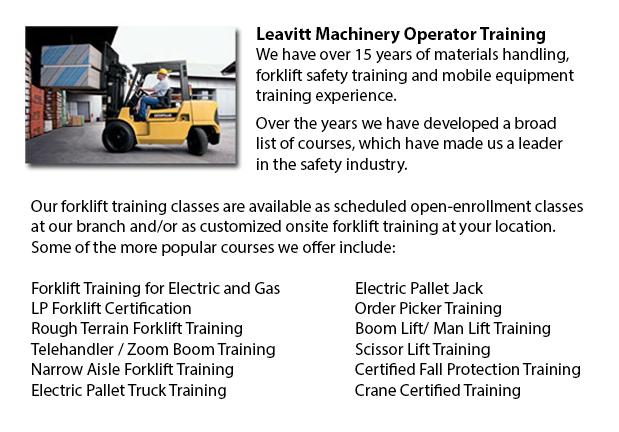
Forklift Certification Schools Alberta - Forklift Certification is mandatory in North America. Therefore, forklift training programs are necessary both for companies and for individuals looking for jobs in industries as operators of forklifts. Forklift training focuses on safety and health issues included in making use of forklifts. Safety concerns affect both the forklift operator and workers and other people who are in close proximity to the forklift. Companies may be subject to penalties if they are caught with un-certified operators during a check up. There are a lot of convincing reasons why businesses need to follow forklift standards.
The majority of federal, state, and provincial regulations require an employee evaluation of the skills required for forklift safety before the employer signs off that the employee is certified. There are a lot of ways to get forklift training for employees, such as online forklift training. Then again, employers need to be aware that forklift certification training is not "just a test". Correct forklift training must contain some fields of study, including theory and hands-on practice. Rules do not require employers to have an outside organization to certify forklift operators.
The suggested program for a quality forklift certification service includes both an onsite component and classroom training. Classroom training typically features informative sessions with videos, power point presentations, discussions and models. Students usually should write a test to check for understanding of subject matter. Certificates of completion are issued upon successfully completing the class.
The use of the equipment evaluation needs the trainee to know the job site dangers, pre-operational equipment check, a pass/fail operational test and operational instruction.
The following subject areas will normally be covered in the training: Understanding legislations and regulations; Controls & Instrumentation; Engine maintenance and Operation; maneuvering and Steering; Fork and Attachment Limitations, Visibility; Rated Capacities, Stability, Maintenance & Inspection; Refueling; Load Control; Pedestrians, and Hazardous Places & Rough Terrain Operation. Additionally, there are training courses offered for workers who are transitioning to new job positions.
-
Crane Training School Alberta
Crane Training School Alberta - The crane training school provides industry-relevant programs. Courses provide trainees with learning results which match current industry demands. Our small class sizes combine theory and hand-on experience. Our quali... More -
Aerial Lift / Boom Lift / Man Lift / Scissor Lift Training in Alberta
Scissor platform lifts are lift truck tables which lift up materials and people and supplies vertically. They are normally utilized in commercial, industrial and construction environments. A common use of scissor lifts is for lowering or lifting cons... More -
Forklift Certification Courses Alberta
Forklift Certification Courses Alberta - Forklift certification really helps to be able to ensure that businesses are following regulations and legislation. Forklift operators must go through certification prior to being permitted to run machinery. I... More -
Manlift Ticket Alberta
Manlift Ticket Alberta - The Elevated Platforms and Manlifts Certification program helps to provide the required training on the safe operating procedures, work practice, rules and regulations regarding the daily activities for the operators of this... More -
Crane Safety Training Alberta
Crane Safety Training Alberta - Both crane driver and their supervisors have to be aware of all the possible problems associated to the operation of an overhead crane. All over North America, there is legislation which provides rules for the safe ins... More -
Fall Protection Training in Alberta
There are high numbers of injuries at work connected to falling and a lot of fall-related deaths reported each year. Most of these instances might have been avoided with better training, better measures in place, and by correctly equipping staff befo... More -
Scissor Lift Ticket Alberta
Scissor Lift Ticket Alberta - Scissor hoists have significantly benefited construction operations in view of the fact that the work that used to need a lot of effort and lots of people, could now be done using the scissor lift and just one individual... More -
Overhead Crane Training Alberta
Overhead Crane Training Alberta - An overhead crane is a huge crane utilized to move and lift large, heavy things that can't be lifted by hand. An overhead crane is typically fixed in place when in use. These machinery are capable of moving huge volu... More

Forklift Training Alberta
TOLL FREE: 1-888-254-6157
forkliftcertificationalberta.com/
Email Us
About Us


